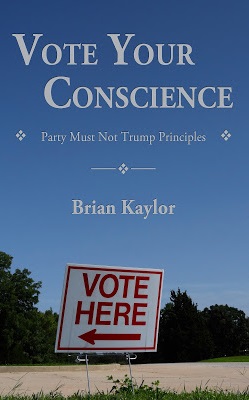Pastors who endorse Donald Trump for president are putting their allegiance to a political party ahead of Christian principles, a Baptist minister with a Ph.D. in political communication suggests in his latest book.
Brian Kaylor, author of Vote Your Conscience: Party Must Not Trump Principles, says the 2016 presidential election poses particular problems for faithful voters as both major candidates come with serious moral concerns.
While a minority of conservative Christian leaders — such as Southern Baptist Convention official Russell Moore — have refused to jump on the bandwagon of the GOP nominee, Kaylor said criticism of ethical scandals dogging Democratic nominee Hillary Clinton has been more muted from the left.
Kaylor, author of previous books Sacramental Politics: Religious Worship as Political Action, Presidential Campaign Rhetoric in an Age of Confessional Politics and For God’s Sake, Shut Up, says Christians of all stripe should resist the siren call of both major political parties to “join the team or else!”
Kaylor, generational engagement team leader for Churchnet — a Baptist network in Missouri — and contributing editor for EthicsDaily.com, says the idea that not voting for one party’s candidate is the same as voting for the opponent is true only “if you’ve given full and complete allegiance to a party.”
“If we’re owned by the GOP, then not voting for Trump hurts our masters,” he writes. “If we’re owned by Democrats, not voting for Clinton hurts our masters. But if we’re voting principles, we’re allowed to reject any party — and they are responsible for that loss for nominating someone unfit for office.”
Kaylor encourages Christians to go to the polls on Nov. 8. “When you do,” he advises, “vote your conscience.”
“There are many races in which you can positively advocate for values you hold dear and policies you support,” he says. “The presidential race gets the most attention, but local races have a large impact — and sometimes a larger impact — on our daily lives.”
Unless you happen to live in one of a handful of states that will swing the election, Kaylor says you can protest both Trump and Clinton by voting for a third-party candidate.
 “That’s what I’ll do on Nov. 8, since Missouri is unlikely to matter,” he said. “If you stay home, your protest is hardly noticed. Voter turnout is already really low and it doesn’t seem to shame politicians, so why would you sitting on a couch bother them? So if you want to make sure the candidates don’t dismiss you as lazy or indifferent — as they will if you don’t bother to vote — then vote for a third-party option on the ballot.”
“That’s what I’ll do on Nov. 8, since Missouri is unlikely to matter,” he said. “If you stay home, your protest is hardly noticed. Voter turnout is already really low and it doesn’t seem to shame politicians, so why would you sitting on a couch bother them? So if you want to make sure the candidates don’t dismiss you as lazy or indifferent — as they will if you don’t bother to vote — then vote for a third-party option on the ballot.”
Kaylor urged engaged Christians to exercise “prophetic imagination” to dream up alternative messages like nearly 900 churches and Christian organizations across the country did that held a special service called “Election Day Communion” in 2012.
“Election Day Communion seemed like a perfect response to the nastiness of the 2012 campaign,” he says. “It offered a chance for churches to reclaim the political agenda and remind people what really matters.”
Kaylor says it is one thing to privately vote for problematic candidates and another thing to publicly endorse them.
“When you publicly endorse a candidate, you endorse the policies they advocate and the rhetoric they employ,” he says. “By publicly endorsing a candidate, pastors will tie their own credibility — and thus the credibility and witness of their churches — to what that candidate says or does.”
“We do not owe our chief loyalty to the Republican Party or the Democratic Party,” Kaylor writes. “Our devotion is not to conservative causes and politicians or liberal causes and politicians. Our allegiance is to the Kingdom of God. We don’t follow the elephant or the donkey; we follow the lamb.”

